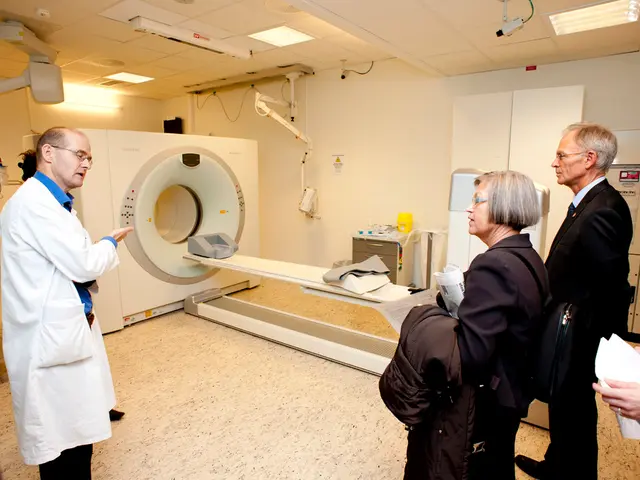Global Healthcare Transformation by AI in 2025: Leaders urged to seize this opportunity immediately, as per Philips Future Health Index
In a significant development, global health technology leader Royal Philips has unveiled its 10th annual Future Health Index (FHI) report. The report highlights the rapid advancement of AI in healthcare, yet emphasises the critical need for trust between clinicians, patients, and AI systems.
The report reveals alarming statistics, such as more than 1 in 4 patients ending up in the hospital due to long wait times, and 31% of cardiac patients being hospitalised before even seeing a specialist. Moreover, 33% of patients have experienced worsening health due to delays in seeing a doctor, and over 75% of healthcare professionals report losing clinical time due to incomplete or inaccessible patient data.
The challenges facing AI adoption in healthcare are manifold. Algorithmic bias, lack of transparency, data privacy concerns, integration into clinical workflows, regulatory uncertainty, and data quality are all hurdles that need to be addressed. If left unchecked, these issues could deepen healthcare disparities and erode trust.
However, several strategies are being developed to bridge these trust gaps. Combat algorithmic bias by training AI on diverse, representative datasets, rigorously validate models, and continuously monitor for disparities. Enhance explainability by adopting explainable AI (XAI) methods. Strengthen data governance through robust data protection frameworks, synthetic data generation, and regular audits. Integrate AI tools into clinical workflows, provide comprehensive training, and establish clear, up-to-date regulations. Improve data interoperability by standardising data formats and leveraging AI to streamline clinical coding and documentation.
The path forward is human-centric AI integration, ensuring systems are transparent, fair, secure, and seamlessly integrated into care delivery. This approach, backed by strong governance, ongoing education, and responsive regulation, will make AI more appealing to both clinicians and patients.
Despite the progress, skepticism remains. Among clinicians, 69% are involved in AI and digital technology development, but only 38% believe these tools meet real-world needs. Trust gaps remain the biggest barrier to widespread AI adoption in healthcare.
As we look to the future, AI could potentially double patient capacity by 2030, with AI agents assisting, learning, and adapting alongside clinicians. However, for this vision to become a reality, regulatory frameworks must evolve to balance innovation with robust safeguards for patient safety and clinician trust.
In more than half of the 16 countries surveyed, patients are waiting nearly two months or more for specialist appointments, underlining the urgent need for action. As the field evolves, continuous dialogue and co-design with end-users will be crucial to sustaining trust and maximising the benefits of AI in healthcare.
- The Future Health Index report, published by Royal Philips, emphasizes the rapid advancement of artificial intelligence (AI) in health tech, acknowledging the critical need for trust between clinicians, patients, and AI systems due to challenges such as algorithmic bias, data privacy concerns, and regulatory uncertainty.
- The report reveals alarming statistics like 1 in 4 patients ending up in the hospital due to long wait times, 31% of cardiac patients being hospitalized before seeing a specialist, and 75% of healthcare professionals reporting lost clinical time due to incomplete or inaccessible data.
- To bridge trust gaps, strategies are being developed, including combating algorithmic bias, adopting explainable AI (XAI) methods, improving data interoperability, integrating AI tools into clinical workflows, and enhancing data governance through robust protection frameworks and regular audits.
- The aim is human-centric AI integration, ensuring systems are transparent, fair, secure, and seamlessly integrated into patient care, backed by strong governance, ongoing education, and responsive regulation.
- Despite progress, skepticism remains, particularly among clinicians, with 69% involved in AI and digital technology development but only 38% believing these tools meet real-world needs.
- If regulatory frameworks evolve to balance innovation with robust safeguards for patient safety and clinician trust, AI could potentially double patient capacity by 2030, with AI agents assisting, learning, and adapting alongside clinicians.
- In more than half of the 16 countries surveyed, patients are waiting nearly two months or more for specialist appointments, highlighting the urgent need for dialogue and co-design with end-users to sustain trust and maximise the benefits of AI in health-and-wellness, particularly in digital health, workplace-wellness, mental-health therapies-and-treatments, and general-news. The importance of science, technology, policy-and-legislation, and politics in shaping the future of AI in patient care cannot be overstated, with data-and-cloud-computing playing a crucial role in its implementation.




